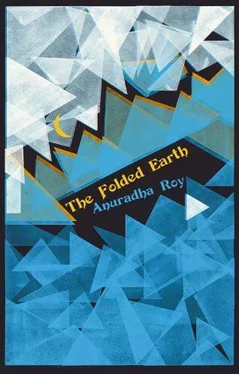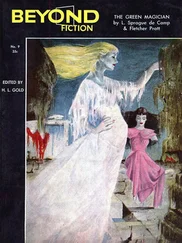I stayed up those nights correcting school homework. I circled words in the grubby exercise book before me: “Ashu was quite”, Guddu had written. “It was quiet cold”; “The mouse in the house sat very quite”. He got it wrong each time. In the next exercise book, Anil had flipped every single S, B, and P to face the wrong way, as he always did. I pushed the books aside. My head sank between my hands onto the table.
In the dark hours my thoughts took a form I would not have recognised in the daytime. If I slept at all, I woke from contorted dreams in which, night after night, Veer held me till I slept, or insistently kissed me awake, or crushed me to bloodied pulp with his jeep, or drove away saying not a word. Sometimes Charu appeared, and sometimes even Kundan Singh. But never Michael. If I shut my eyes and tried to visualise Michael, the elements of his face refused to coalesce into anything recognisable. I discovered I could no longer hear his voice in my ears, or the sound of his laugh, or the way he cleared his throat every few sentences when speaking.
I sifted through my mind for whatever I could retrieve of him, reconstructing our years together: the way I pretended sleep so that he would bring tea to our bed each morning, tugging a tuft of my hair to wake me. How we would eat omelettes day after day because we had failed somehow to shop or cook.
I longed for the simple joy of being married to him, and to have him there to confirm my memories — was our cupboard black or brown? Did the neighbours really have a dog called Simona? Where was that bouldered and scrubby place we went to, the day his motorbike was delivered after weeks of waiting? He had driven very fast and we were wildly gleeful, like children who had escaped school.
I had been told that if you put your ear to a railway track, you could feel the vibration of a train many miles distant. Could Michael, wherever he was, hear me if I called out to him? I dreamed myself back to Hyderabad’s long-ago summer afternoons, birds and mosquitoes falling exhausted in the scorched air, the heat-dead stillness churned by the creak of our ceiling fan. We lay on the bare, cool floor sometimes, and sometimes in the narrowness of our single bed, pillows, sheets and floor slipping away as we tore at each other as if after days of starvation. I had to touch Michael all the time, to make sure he was next to me when I slept and was still there when I awoke. When the monsoon came that first year it had rained as it never had before. We could hear nothing but the shout of rain on the roof, on and on all night, as we slept and woke and murmured to each other and slept and woke again, as if the night itself were something fluid we were swimming through, pausing for breath, then swimming again. I would memorise Michael’s face with my fingers as he slept so that I could travel its ridges and valleys through the hours of his absences: lines had been made on it by thoughts I would never know. I was jealous beyond reason of his past. If I had my way, I would not have shared his shadow with anyone else. “Was it the same for you?” I wanted to ask him now.
I was nineteen when we married, still at college. I returned to classes a week after our wedding. I would stare at the neem tree by my classroom window, and in the middle of a lecture on the Delhi Sultanate I would lose myself in daydreams until at length the professor’s voice once again became audible, hammering at me from somewhere far off: “Can you repeat the assessment I just made of Qutb-ud-din-Aibak and the Slave Dynasty? I’m speaking to you. To you, Maya.”
Michael used to grumble about the size of our two rooms. “It’s a shed,” he said, “they must have built it as a garage.” The place did look smaller with him in it. The ceiling was low, the bathroom was a little box where your elbow knocked painfully against a tap if you turned. He was tall and somewhat clumsy, so he tended to bang into things. I would lie back in bed and watch him, filled with adoration as he puzzled his way through making coffee in our new kitchen, on our new gas stove. Mostly he gave up, and walked back towards our tousled bed, his eyes on me with a look of yearning so distilled, so intense, that I had to turn away for fear of its strength.
In those days in Hyderabad, if Michael tossed and turned, I got up to sprinkle water on our sheets to cool the room. If the electricity went, I would sit up, fanning us both with a newspaper. He slept through it all, exhausted by his long day at work rushing through the burning summer air on his motorbike, wherever his newspaper sent him to take pictures. I would look at his helpless, sleeping face and though he could not hear me, I whispered endearments so tender that they would have curled away and died if exposed to the light of day.
“I couldn’t say them to you then, but I wish you knew,” I said now, and tried to hear his voice replying. But all I heard was foxes calling to each other and pine needles sprinkling down on the tin roof, making a sound like rain.
In colonial times, the summer months in Ranikhet meant horse races and moonlit picnics, and even now we have a “season” when the town is crowded with people who come up from the plains to escape the heat. They are everywhere for a few weeks: tourists, summer residents, day trippers. Scholars would turn up to see Diwan Sahib. Trekkers heading for the high Himalaya paused in Ranikhet en route; all kinds of people wandered in and out of the Light House as if it were a public monument. If they found Diwan Sahib in the garden they stopped to pump him for information about the hills or to photograph him as a relic of the Raj, a bona fide old Indian nobleman. Sometimes supplies would arrive for one of Veer’s trekking groups, or middlemen tasked with requisitioning porters in the Ranikhet bazaar would come and stay for hours, poring over details. There was a young assistant Veer had employed, who was stationed at the house from time to time. He hovered all day, appearing to do nothing more substantial at all.
Ever since Veer had taken up residence at the Light House, Diwan Sahib’s writing had barely progressed. If I asked him for new chapters to type, he waved his hand at whoever happened to be visiting and said, “I can’t write when there are so many people. I’ll wait till the season ends and then we’ll finish chapter seven. I’ll get the book done this year, that’s a promise. I don’t have much more time. That Welsh poet, what was his name? We learned his poem in school — ‘Job Davies, eighty-five/Winters old and still alive/After the slow poison/And treachery of the seasons.’ — did you have to learn it too?”
“No,” I said.
“You should. Good poem. I’m like Mr Davies — worse — I’m eighty-seven! Every morning I wake up and tell myself, ‘What, still alive?’ I truly don’t have long.”
“You don’t want to write any more,” I said. “There’s too much else to do.” I pointed to the bottle on the table next to him. Now that Veer kept him supplied with superior alcohol, Diwan Sahib’s durbar began soon after breakfast and went on long into the afternoon. He would keep postponing lunch, pouring himself yet another drink, waving Himmat Singh away each time he said, “Shall I serve lunch, Sa’ab?” Mr Qureshi too was under the spruce tree nursing his steel glass on most days. He seemed to have abandoned his workshop to his son.
“Maybe if you wrote for an hour or so in the morning before starting on the gin?”
“What nonsense,” Diwan Sahib said, and poured himself another large measure. “Don’t be such a schoolteacher. My taste buds feel as if they’ve come back to life after twenty years dormant.” He turned to Mr Qureshi and said, “You were going to tell me something. This girl interrupted you.”
Читать дальше












